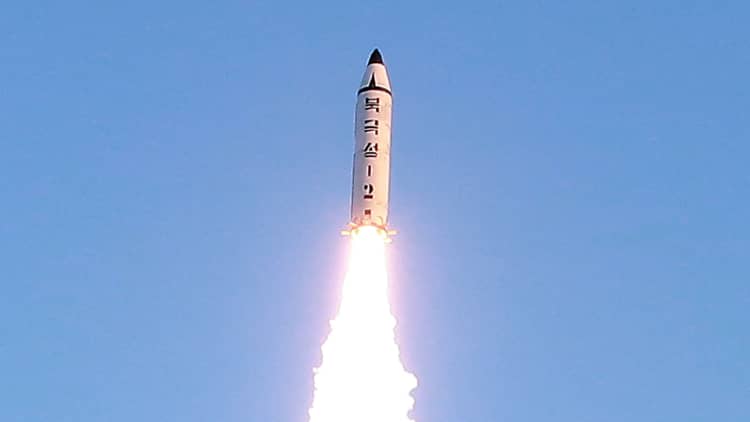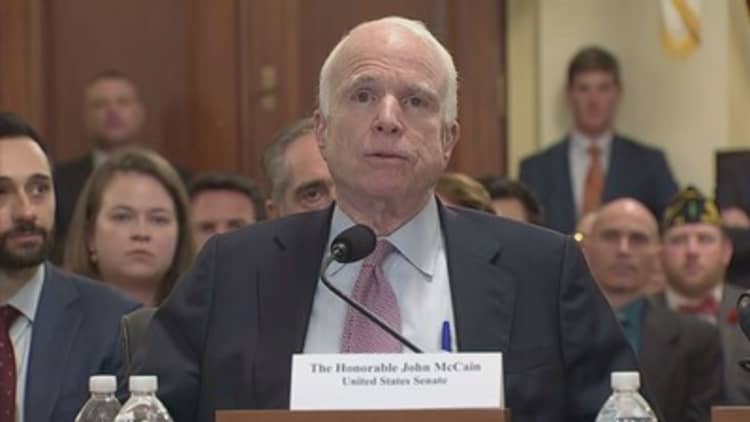
The general who commands America's nuclear arsenal on Tuesday warned about North Korean missile advances, calling it "very challenging" in remarks to a Senate panel.
At the same time, Gen. John Hyten, U.S. Air Force Commander of the U.S. Strategic Command, expressed frustration about the lengthy delays and budget instability that he said are hindering the ability to modernize the nation's nuclear deterrence capabilities.
Speaking to the full Senate Armed Services Committee, Hyten said North Korea now has the capability to deploy an intercontinental ballistic missile and hinted it's only time before they can do it with a nuclear warhead. He said the rogue Asian nation also demonstrated new capability in February that moved them into a new league with solid-fueled missile technology.
"Ballistic missile proliferation is increasing as more countries acquire greater numbers of ballistic missiles while simultaneously advancing technical sophistication to defeat U.S. defense systems," Hyten testified.
The Air Force general said the U.S. must continue to advance its missile capabilities and forces to deter threats and aggression. But he said if the U.S. military doesn't get stable budgets to modernize its capabilities there could be risks.
As an example, he said the Navy's Columbia-class nuclear missile submarine program is delivering new ships on a "just in time" basis. However, if the program slips due to budget issues it will be falling below required numbers and pose a problem for military leaders due to the existing fleet of aging Ohio-class submarines.
"There is a certain time in the future where the Ohio-class submarine... will not go under the water anymore," the general said. "Just the pressure on the vessel itself will not allow it to go down. That [program] has to stay on time."
The government's funding using a continuing resolution, or CR, "makes it very hard to start new programs," Hyten said. Moreover, he said as weapons programs move from development phase into production the CR means "you can't ramp up the funding you need."
The general also said the effect of the CR is the government breaks defense contracts. "It's a very significant issue in terms of cost to the taxpayers as well as risk to our national security."
Hyten also vented that the Pentagon's current weapons acquisition process is dysfunctional despite earlier attempts to streamline it. His lengthy military career included earlier roles in a variety of space acquisition and operations positions.
"Our acquisition system has not been very effective in the last 10 years in delivering things on time," he said. "I think what you have to do is eliminate a lot of the bureaucracy in the middle."
Tuesday's hearing also touched on how there's an added risk since early warning missile sensor technology used by the U.S. military in space is seen as increasingly vulnerable due to advances by China and others. The growing threat of offensive space weapons also troubles other experts.

The Senate panel also discussed vulnerabilities of defensive options available to the U.S. Specifically, Hyten was asked generally about capabilities after a launch of nuclear weapons by an adversary as well as post-launch interceptors — a weapon designed to disable weapons in the early launch phase (sometimes known as the boost phase).
"We don't have a significant, or really any boost phase, intercept capability," the general said. "It is a very challenging technology because you basically have to be properly positioned with the right kind of weapons capability in order to respond to an immediate launch."
Indeed, if you look at the North Korean launch on Feb. 11, it occurred out of a new location and with new capability — including a new transporter erector launcher technology believed to have been developed by the regime that has threatened the U.S. "All those things bring… the time of warning down to a very small number," Hyten said, reiterating the importance of being properly positioned to respond to the threat.
The general said the new solid-fueled missile demonstrated by the North Koreans and the new launcher "showed a new technology, a new North Korean capability to employ a very challenging technology for us." That's because the liquid fuel that the North Koreans previously used takes more time to prepare and offered the U.S. time to observe, watch and prepare for any responses.
Yet the solid-fuel missile can be "rolled out and launched at a moment's notice," Hyten said. "They moved what was demonstrated at sea onto land."
Hyten oversees the global command and control structure of U.S. strategic forces, including the nation's three-leg nuclear deterrent — land, sea and air-based capabilities.
The nuclear triad has been a centerpiece of the nation's strategic defense since the 1960s but relies in part on an aging stockpile of weapons and delivery systems. But the general said the last 20 years the U.S. has "deemphasized nuclear weapons" while adversaries have been investing in them in recent years.
"We need to modernize our capabilities across the board," he said. "I never want to be able to sit down with a potential adversary and have a negotiation from a position of weakness."
Elsewhere, Hyten said the Russian's ground-launched cruise missiles are currently in violation of the INF Treaty (a 1987 agreement formally known as the Intermediate-Range Nuclear Forces Treaty). "We have no defense for it," he said, adding that the Russian system can carry nuclear-tipped weapons and threaten most of the continent of Europe depending on where it is deployed.
"It is a concern and we have to figure out how to deal with it as a nation," Hyten said.
Senate Armed Services Committee Chairman John McCain (R-Arizona) responded that the Russian cruise missiles and INF Treaty violation was "a compelling argument for [Russian President] Vladimir Putin's disregard for most norms of behavior."
Hyten said the U.S. needed to respond to Moscow's moves by strengthening its own forces and capabilities.
"The only way we can deal with them in the future is from a position of strength," the general said. "I'm asking for help in modernizing our entire forces…to make sure we can deter not only today but in the future."
Watch: Trump on N. Korea, China



